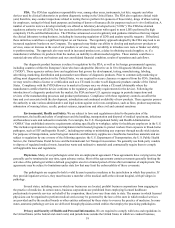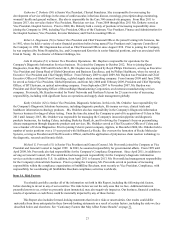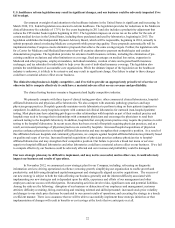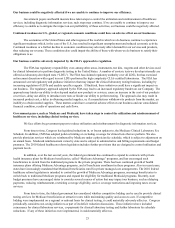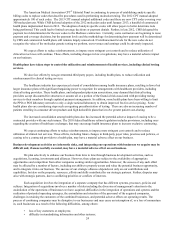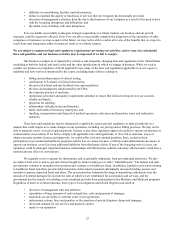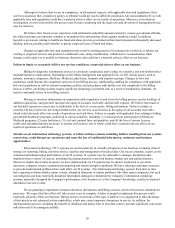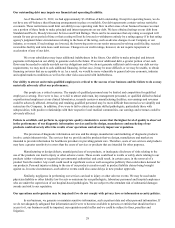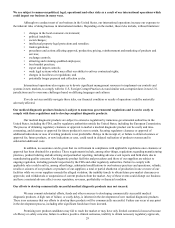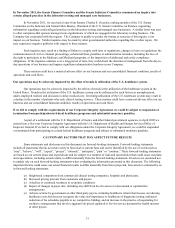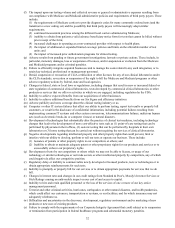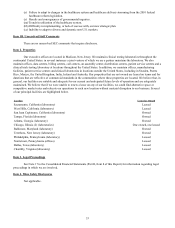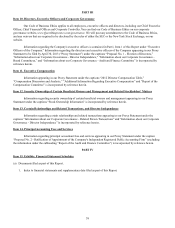Quest Diagnostics 2012 Annual Report Download - page 31
Download and view the complete annual report
Please find page 31 of the 2012 Quest Diagnostics annual report below. You can navigate through the pages in the report by either clicking on the pages listed below, or by using the keyword search tool below to find specific information within the annual report.28
Our outstanding debt may impair our financial and operating flexibility.
As of December 31, 2012, we had approximately $3.4 billion of debt outstanding. Except for operating leases, we do
not have any off-balance sheet financing arrangements in place or available. Our debt agreements contain various restrictive
covenants. These restrictions could limit our ability to use operating cash flow in other areas of our business because we must
use a portion of these funds to make principal and interest payments on our debt. We have obtained ratings on our debt from
Standard and Poor's, Moody's Investor Services and Fitch Ratings. There can be no assurance that any rating so assigned will
remain for any given period of time or that a rating will not be lowered or withdrawn entirely by a rating agency if in that rating
agency's judgment future circumstances relating to the basis of the rating, such as adverse changes in our Company or our
industry, so warrant. If such ratings are lowered, the borrowing costs on our senior unsecured revolving credit facility, secured
receivables facility and term loan could increase. Changes in our credit ratings, however, do not require repayment or
acceleration of any of our debt.
We or our subsidiaries may incur additional indebtedness in the future. Our ability to make principal and interest
payments will depend on our ability to generate cash in the future. If we incur additional debt, a greater portion of our cash
flows may be needed to satisfy our debt service obligations and if we do not generate sufficient cash to meet our debt service
requirements, we may need to seek additional financing. In that case, it may be more difficult, or we may be unable, to obtain
financing on terms that are acceptable to us. As a result, we would be more vulnerable to general adverse economic, industry
and capital markets conditions as well as the other risks associated with indebtedness.
Our ability to attract and retain qualified employees is critical to the success of our business and the failure to do so may
materially adversely affect our performance.
Our people are a critical resource. The supply of qualified personnel may be limited and competition for qualified
employees is strong. If we were to lose, or to fail to attract and retain, key management personnel, or qualified skilled technical
or professional employees at our clinical laboratories, research centers or manufacturing facilities, our earnings and revenues
could be adversely affected. Attracting and retaining qualified personnel may be more difficult than normal as we simplify and
restructure the Company. In addition, if we were to fail to attract and retain skilled pathologists, particularly those with
subspecialties, with positive relationships with their respective local medical communities, our earnings and revenues could be
adversely affected.
Failure to establish, and perform to, appropriate quality standards to assure that the highest level of quality is observed
in the performance of our diagnostic information services and in the design, manufacture and marketing of our
products could adversely affect the results of our operations and adversely impact our reputation.
The provision of diagnostic information services and the design, manufacture and marketing of diagnostic products
involve certain inherent risks. The services that we provide and the products that we design, manufacture and market are
intended to provide information for healthcare providers in providing patient care. Therefore, users of our services and products
may have a greater sensitivity to errors than the users of services or products that are intended for other purposes.
Manufacturing or design defects, unanticipated use of our products, or inadequate disclosure of risks relating to the
use of the products can lead to injury or other adverse events. These events could lead to recalls or safety alerts relating to our
products (either voluntary or required by governmental authorities) and could result, in certain cases, in the removal of a
product from the market. Any recall could result in significant costs as well as negative publicity that could reduce demand for
our products. Personal injuries relating to the use of our products can also result in product liability claims being brought
against us. In some circumstances, such adverse events could also cause delays in new product approvals.
Similarly, negligence in performing our services can lead to injury or other adverse events. We may be sued under
physician liability or other liability law for acts or omissions by our pathologists, laboratory personnel and hospital employees
who are under the supervision of our hospital-based pathologists. We are subject to the attendant risk of substantial damages
awards and risk to our reputation.
Our operations and reputation may be impaired if we do not comply with privacy laws or information security policies.
In our business, we generate or maintain sensitive information, such as patient data and other personal information. If
we do not adequately safeguard that information and it were to become available to persons or entities that should not have
access to it, our business could be impaired, our reputation could suffer and we could be subject to fines, penalties and
litigation.


